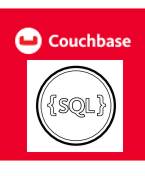| Couchbase Server 4.0 Now With N1QL |
| Written by Kay Ewbank | |||
| Wednesday, 28 October 2015 | |||
|
The latest release of the Couchbase NoSQL distributed database is now generally available. Couchbase 4.0 has a new query language, N1QL that combines SQL with JSON.
The new SQL-based query language, N1QL (pronounced Nickel), is designed to help developers familiar with SQL to build applications on top of a JSON data model that can be extended on demand. N1QL lets you use familiar SQL code, so you can use the declarative query language to express logic that will be executed in the database, rather than writing and executing it within the application. N1QL also lets you use JSON to nest data in a single document or make use of N1QL to model and query data that is stored across multiple documents. The new version also has standard SQL-based reporting and data visualization tools for working with data stored in Couchbase. Multi-dimensional scaling has also been added in Couchbase Server 4. This, along with support for global secondary indexes, should improve query performance in distributed databases. The multi-dimensional scaling means systems can be scaled up or scaled out. The support for global secondary indexes extends the gains achieved through multi-dimensional scaling. In a horizontal scaling system, the index is spread across all the servers, which can slow down query execution by creating a broad “scatter/gather” requirement. Couchbase Server 4.0’s multi-dimensional scaling means you can assign global secondary indexes to specific hardware resources, so improving the performance of query execution in distributed systems. Another improvement to the new version is cross-data center replication filtering. This means that instead of replicating entire datasets across data centers, you can filter subsets of data for geographic replication. This can reduce latency, minimizing network traffic by replicating only the data relevant to a specific region or country. Geospatial indexes are the final major new feature. You can create spatial indexes on GeoJSON or numeric data, enabling the development of applications that query geographic data in multiple dimensions. The geospatial indexes can be used alongside more conventional indexes to enable searches that combine both geographic and non-geographic terms. The The new server will eventually have full text search support via a system currently in preview. The new system, CBFT, is currently in developer preview. It is built on the open source Bleve project. This is a full-text library written in Go. CBFT will allow you to add full-text search capabilities to your application without having to deploy additional infrastructure dedicated to search. Bleve supports text analysis, faceting, scoring, and highlighting while enabling applications to perform term, fuzzy, phrase, match, match phrase, and prefix queries.
More InformationRelated ArticlesWhat Happens To Couchbase Now?
To be informed about new articles on I Programmer, sign up for our weekly newsletter, subscribe to the RSS feed and follow us on, Twitter, Facebook, Google+ or Linkedin.
Comments
or email your comment to: comments@i-programmer.info
|
|||
| Last Updated ( Wednesday, 28 October 2015 ) |



